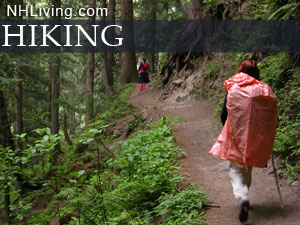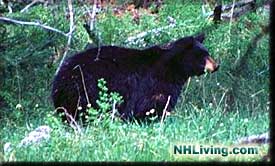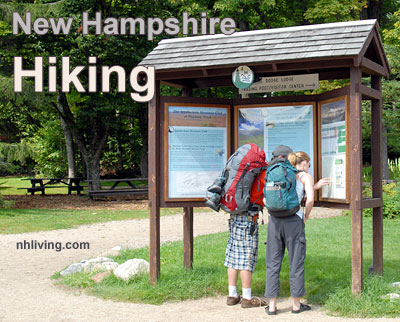Safety Tips for Hiking New Hampshire Trails
Tips & Tricks For Staying Safe on NH Trails
 New Hampshire is an ideal choice for your hking vacation. More than 500,000 people visit New Hampshire to hike every year. Trails like Bald Mountain, Artist’s Bluff, and the Basin-Cascades trail make hiking in New Hampshire something that few people could ever forget. Ask about NH hiking or share trail comments. To feature your business in NHLiving, contact us.
New Hampshire is an ideal choice for your hking vacation. More than 500,000 people visit New Hampshire to hike every year. Trails like Bald Mountain, Artist’s Bluff, and the Basin-Cascades trail make hiking in New Hampshire something that few people could ever forget. Ask about NH hiking or share trail comments. To feature your business in NHLiving, contact us.
NH Hiking Guide and Hints

Franconia Inn, 1300 Easton Rd., Franconia, NH 03580 | 603-823-5542
"In the Land of Big Mountains and Small Villages." Nestled in the heart of the beautiful White Mountains of New Hampshire, The Franconia Inn is a full service country inn, where casual elegance and exquisite cuisine are just waiting to welcome you. Please visit our website for more information.
Visit Franconia Inn - Franconia, NH

Partridge Cabins, 3 Partridge Road, US Route 3, Pittsburg, NH 03592 | Ph: 603-538-6380
Visit Partridge Cabins and Lodge - the four season place to be. We have 600 feet of lake frontage, and offer housekeeping cabins situated amidst the shade of sheltering spruce and fir trees. Completely winterized cabins with gas heaters, private baths, with hot and cold running water, electricity, and full kitchen facilities. All cabins are attractively furnished, and accommodate 4-8 people. Snowmobile, cross-country ski, hike, moose watch, and let's not forget fishing and hunting! Summer, fall, winter, and spring, you will find Partridge Lodge & Cabins most pleasing.
Visit Partridge Cabins - Pittsburg, NH

Cabot Inn & Suites, 200 Main Street, Lancaster, NH 03584 | 603-788-3346
A four-season family resort located in the heart of the White Mountains, over-looking the Presidential Range. Cabin Inn & Suites features a fitness center, indoor pool, banquet hall, and 60+ acres, with breathtaking views of the mountains. Bretton Woods, Cannon, Wildcat, Attitash, Loon, Black Mountain, Cranmore ski areas nearby. Family restaurant and lounge. Indoor heated pool, game room, outdoor playground, video game hook-ups. Santa’s Village, Six Gun City, Story Land, Whale’s Tale Water park a short drive away.
Visit Cabot Inn & Suites - Lancaster, NH

Inn at Ellis River House B&B Inn, 17 Harriman Road, Jackson, NH 03846 | 603-383-9339
Enchanting Country Inn offering "Romance & Rejuvenation" on the river in the heart of the White Mountains. 20 rooms and cottage are beautifully appointed with period and modern amenities. Many have Jacuzzis for two and/or balconies, most have fireplaces. Gourmet country breakfast and afternoon refreshments included. Enjoy the cozy game room/pub, hot tub, sauna, and outdoor heated pool. Relax, re-discover lifes simple pleasures, hike, fish, golf nearby, cross country or downhill ski, outlet shop and more. Let the Inn at Ellis River rejuvenate your spirits!
Visit Inn at Ellis River - Jackson. NH

Swiss Chalet Village Inn, 457 Intervale Resort Loop, Intervale, NH 03845 | 800-831-2727
The Swiss Chalet Village Inn offers comfortable lodging at an affordable price. Choose from a wide variety of rooms to meet your needs. Wheather you are here for a family outing, wedding, business or pleasure, you will find clean, comfortable White Mountain lodging. Pet Friendly Rooms available. Please inquire.
Visit Swiss Chalet Village Inn - Intervale, NH

Best Western White Mountain Resort, 87 Wallace Hill Road, Franconia, NH 03580 | 603-823-7422
A distinct White Mountain New Hampshire hotel where great accommodations and low discounted hotel rates are always found! Unique and charming, this White Mtn lodging facility is guest friendly, clean, comfortable and affordable. For Leisure, Holiday, Vacation, Business, Conference, or for Tour Bus operators. Check availabilites and special rates. Pet Friendly.
Visit Best Western White Mountain Resort - Franconia, NH

The Valley Inn, Ascend Hotel Collection, 17 Tecumseh Road, Waterville Valley, NH 03215
Escape to The Valley Inn in Waterville Valley, NH, where mountain charm meets modern comfort. Nestled in the heart of the White Mountains, this cozy retreat offers breathtaking views, easy access to outdoor adventures, and a welcoming atmosphere for families and couples alike. Whether you're skiing in winter, hiking in summer, or simply relaxing, The Valley Inn is your perfect getaway destination! Check availability and current specials below.
Waterville Valley Resort, The Valley Inn, Waterville Valley, NH
Hiking in New Hampshire can be fun and exciting. However, a bad situation can make an exciting hike not so enjoyable, and sometimes dangerous. There are tips for many situations that a hiker can encounter during a hike. Please scroll down or click the links below to jump to the corresponding section.
General Tips | Lost Hiker | Bears | Insects | Snakes | Drinking Water
Lightning | First Aid | Crossing Water | Hypothermia
Back to NH Hiking
 General Hiking Tips
General Hiking Tips
Footwear
Generally, wearing hiking boots is a better idea than wearing shoes. Trails can sometimes become rough or treacherous; boots prevent twisted ankles or knees. Its a good idea to break your boots in before you hit the trail.
Food & Water
Make sure that you bring plenty of water. Up to three quarts per person in hot weather. If you hike with your pet, make sure that you have brought enough water for them also. Do not drink water directly from streams or pool without treating it first. Parasites or micro bacteria can live in natural water sources. Bring ample food supplies.
Checklists
Check weather reports before you leave. Take a detailed map or trail guide of the area you are hiking. Check with local ranger stations about any special regulations. Always let someone back home know where you are going and the approximate time of your return.
Tips for the Lost Hiker
- Stay in one place! This will make you easier to find and you will be able to conserve your energy.
- Put on additional clothing to keep warm as needed.
- Light a fire; this can keep your spirits up, keep you warm, help rescuers to find you, and in some cases, keep animals away.
- Pile grass, tree limbs and brush around you to break the wind.
- Sit on your hiking pack to keep yourself off of the ground; this will keep you clean and dry.
- Remember one thing… relax. There are many cases where people have survived for several nights with only a few items that they had with them.
- If a member of your party is overdue or you suspect that they are lost, notify the local sheriff’s office or the ranger station.
- Stop and treat all injuries immediately.
- If you must leave a member of your party behind, leave them shelter, food, and a message describing their injuries and where you have gone.
Hikers and Bears
 With the growing number of bears, it is important that those who hike in the woods of the United States keep their wits about them when it comes to bears. The population of Black Bears in the U.S. has grown exponentially in the past few years.
With the growing number of bears, it is important that those who hike in the woods of the United States keep their wits about them when it comes to bears. The population of Black Bears in the U.S. has grown exponentially in the past few years.- These guidelines and are not a guarantee for your safety.
- Try to keep you distance from bears as much as possible. Make noise when you hike, this will help you avoid sneaking up on a bear.
- If you see a bear from a safe distance, shouting and/or loud noise will usually scare it away.
- If shouting does not work in scaring the bear off, back away slowly. NEVER turn your back to the bear. Turning away and/or running can trigger and stimulate the bears hunting instincts.
- As cute as they can be, avoid bear cubs. Avoid coming between a cub and its mother.
- When camping, use bear resistant containers to store food. Store food away from the campsite, and never in your tent.
- An alternative to bear resistant containers is to double pack food in sealable bags. Since a bear’s sense of smell is much greater than a humans, the odor of the food will be reduced.
- Never approach an injured animal.
- The United States National Parks Service recommends that hikers carry aerosol pepper spray. Pepper spray will deliver a temporary incapacitating discomfort in bears. This is not 100% effective. Sometimes it works, sometimes it does not. It depends on the environment (humidity, rain, etc.)
- Laying face down with your hands and fingers interlaced behind your head to protect your neck is the best course of action to take when and if attacked by a bear.
- Keep your legs spread apart to help prevent being rolled over and exposing your abdomen. If the bear does roll you over, try to use the momentum to roll over onto your stomach again.
- Wearing a pack, even when hiking for a short time, can create a buffer between you and the bear.
- If you are being stalked by, or are confronted by a bear, loud noises or using rocks and large sticks to intimidate the bear into thinking you are not an easy prey can deter it.
- You cannot climb a tree to escape a black bear. Grizzlies, however cannot climb trees. Their claws cannot support their weight. There are no Grizzly Bears in New England
Insects
- Avoid sitting on rotten logs or kicking stumps. Spiders like cool, dark places. Bees and ants will sometimes make their home in old logs or rotting stumps.
- When camping, check the area closely for signs of insect activity. Not all bees make nests in trees, some make their nests in the ground.
- Keep food sealed. Ants can find food easily, bees are attracted to sugary food and drinks. Yellow Jackets have been known to crawl into open soda cans.
- If you allergic to bites and stings, take the proper medication with you. Even if you are not sure if you are allergic, you should bring some StingEze or antihistihamine.
- Bee stings can be treated with ice if nothing else is available to reduce swelling. Monitor the victim, as you should with all insect bites and stings.
Snakes
- Snakes, like bees and spiders, usually are found hiding under logs, rock piles, and in dark areas. However, they can be found sunning themselves on rocks or in limbs hanging over water.
- Avoid turning logs and rocks over. If you do have to turn a log over, roll it toward yourself to keep it between you and a potential hazard.
- Do not reach into cracks and crevices of rock formations.
- Avoid brush piles.
- Keep your eyes on the trail as much as possible. Spotting a snake before it sees you can be very advantageous
- If you find yourself close to a snake, move away from it very slowly. Do not make any sudden movements.
- A rule of thumb with snakes is that a snake can only strike one-half of its body length. It is a good idea not to put this rule of thumb into practice.
What to do if you are bitten by a snake
- Calm the victim and, if possible, wash the bite.
- Keep the wounded extremity inactive and below the level of the heart.
- Transport the victim to a hospital immediately.
- Tourniquets are most often not recommended, use them only as a last resort. Because tourniquets can result in amputation, they are best only to be used if a bite is inflicted far from transportation or if bleeding is uncontrollable.
- Non-poisonous bites also need attention. A trip to the nearest medical facility is recommended.
Drinking Water
- Boil stream water for at least 10 minutes before drinking.
- Instead of boiling, you could treat water with iodine.
- There are companies that manufacture filters that allow you to draw water from a stream and filter out bacteria, viruses and parasites.
- Keep you water bottles clean. Water left inside a container can produce microbes. Sanitize the bottle with water and baking soda, or vinegar and let it soak for a few minutes.
Lightning
- Avoid water, high ground, open spaces, and metal objects.
- Do not hide underneath canopies, small picnic or rain shelters, or near trees.
- If possible, find shelter in a substantial building or in a fully enclosed metal vehicle such as a car with the windows completely shut.
- Crouch down, put your feet together, place your hands over your ears to minimize hearing damage due to thunder.
- Keep at least 15 feet from other people.
First Aid
- Always carry a first aid kit. There are many different types for many different situations.
- Consider taking a first aid course. If that is not possible, lightweight, waterproof guides can be purchased.
Crossing Water
- Although you may not always be able to see it, rocks near streams and waterfalls can be slippery due to a thin layer of algae that can build up and be nearly invisible.
- When crossing a small stream, look for dry rocks to step on. Use caution when stepping on wet rocks. Crouch down to lower your center of gravity.
- When crossing larger steams, face up stream. If you have a partner with you, interlock arms and move across together.
- When you cross, slide your feet along. Do not step normally or cross your steps, this makes you stand on one leg for a short period of time.
- Beware of mud on your boots, that can make almost any rock slippery.
Hypothermia
- Check the weather before you head out. Check for cold fronts and any weather systems that may be coming through.
- If there is a chance of precipitation, pack a light weight rain jacket. Preferably one with a hood.
- If you must cross several streams, pack extra dry clothes.
- On cool days, wear a hat and bring gloves. You may not need the gloves when moving, but they will be nice when you rest.
Warning Signs of Hypothermia
- Increased or uncontrollable shivering
- Stiffness or soreness in the fingers and hands.
- Soreness in the feet.
- Unusual fatigue and weakness
What To Do
- Consult your map or trail guide to find the quickest way back to your vehicle.
- Be sure to use a trail, this is not a good time to get lost.
- If you, or a partner, are experiencing the initial signs, movement can warm your body temperature. Don’t over exert yourself.
- If you are planning to spend a night in the outdoors, you would most likely be carrying an extra set of clothes. Change immediately, set camp, and start a fire. If fires are not allowed in the area you are hiking, your camping stove will be the next best thing.
Signs and Symptoms of Hypothermia
- Shivering stops
- Semiconscious or complete loss of consciousness
- Muscle stiffness
- Confusion or irrational thinking
- Breathing and heart rate slow down
New Hampshire Hiking Trails

NH Lodging Guide | Weddings
Products | NH Town Guides
New England Living Magazine
Free World Mall
Country Weddings | New England Recipes
Paradise Coast Living | Boston Red Sox Gifts
Vermont Living | ME Living | MA Living






